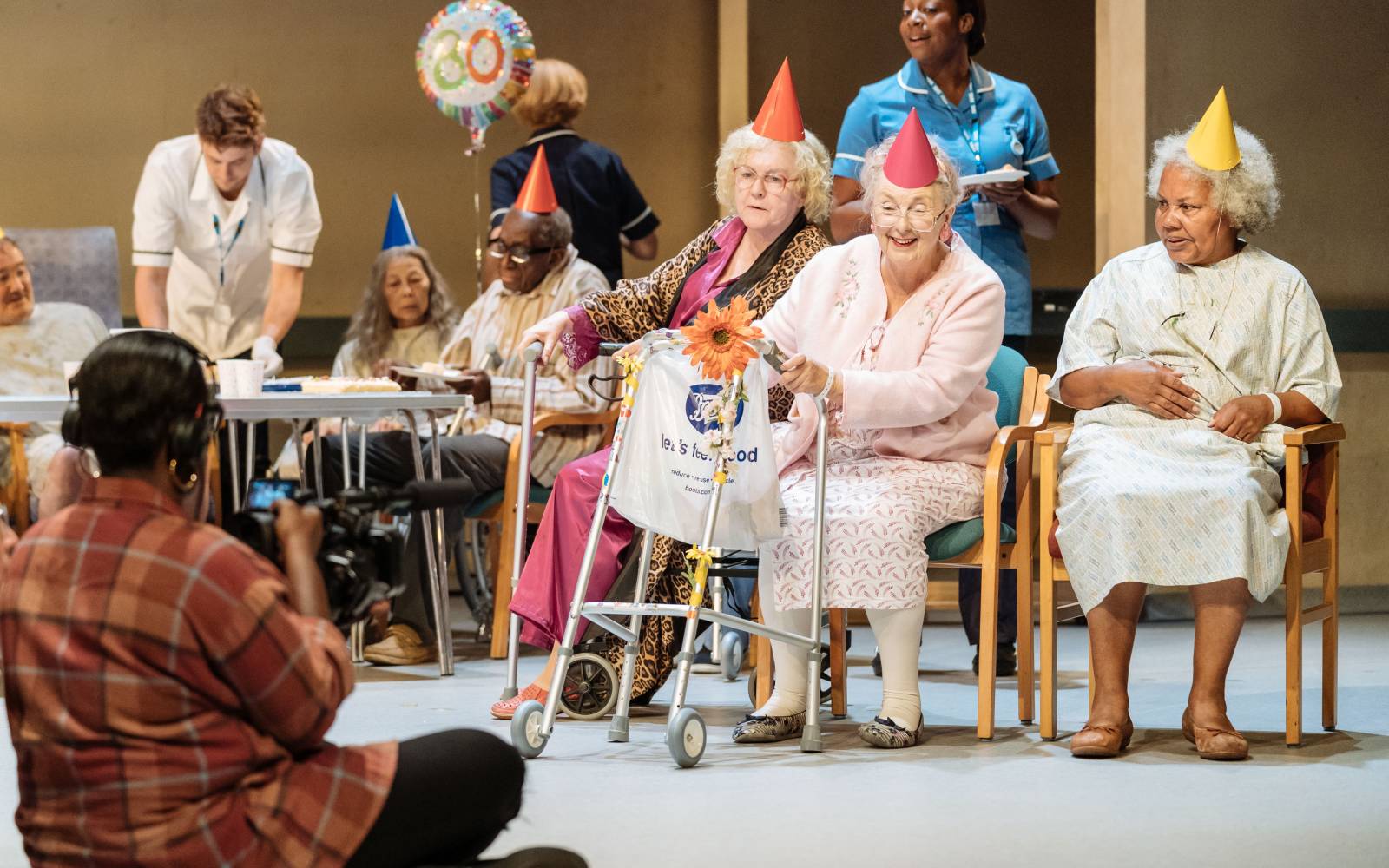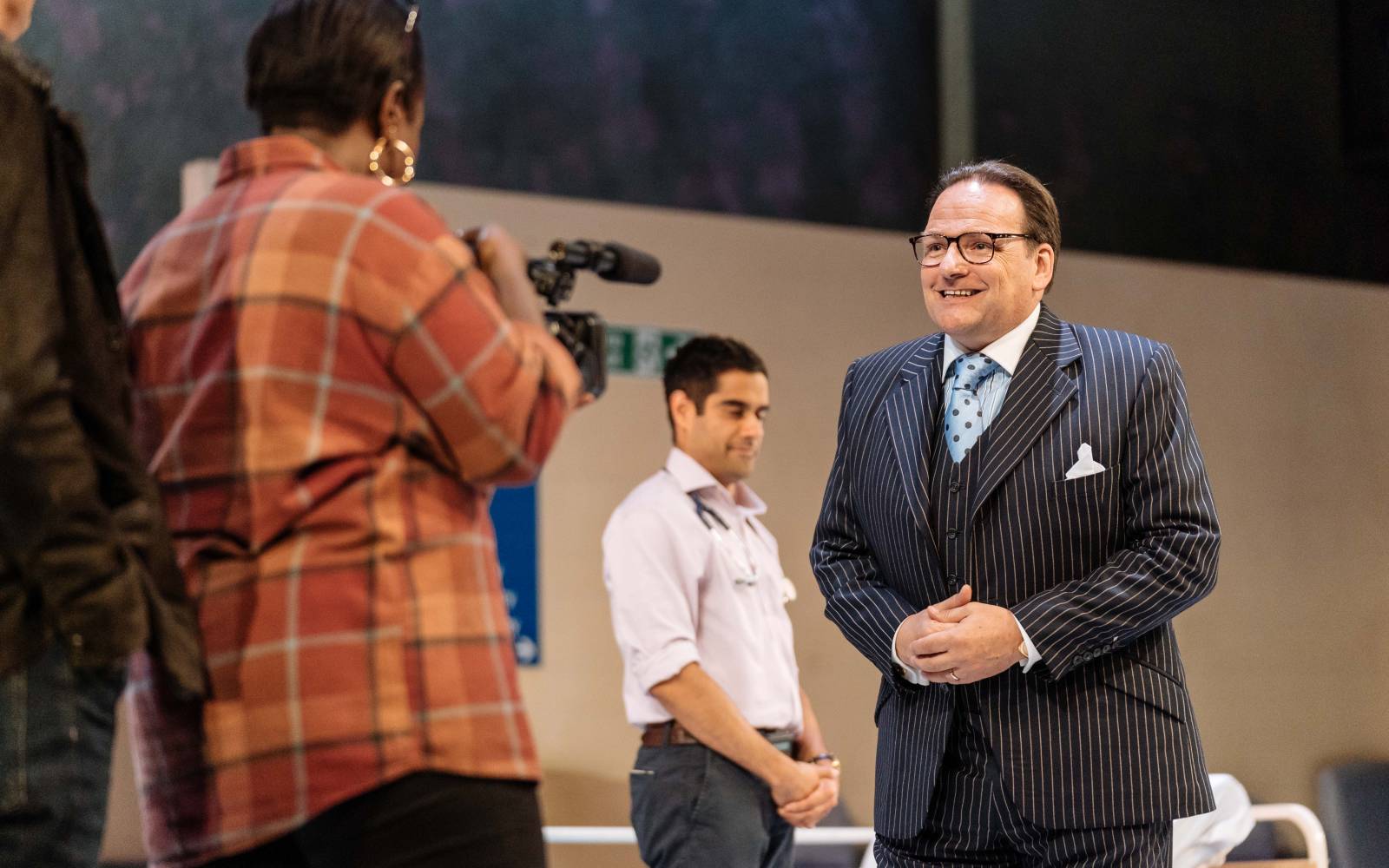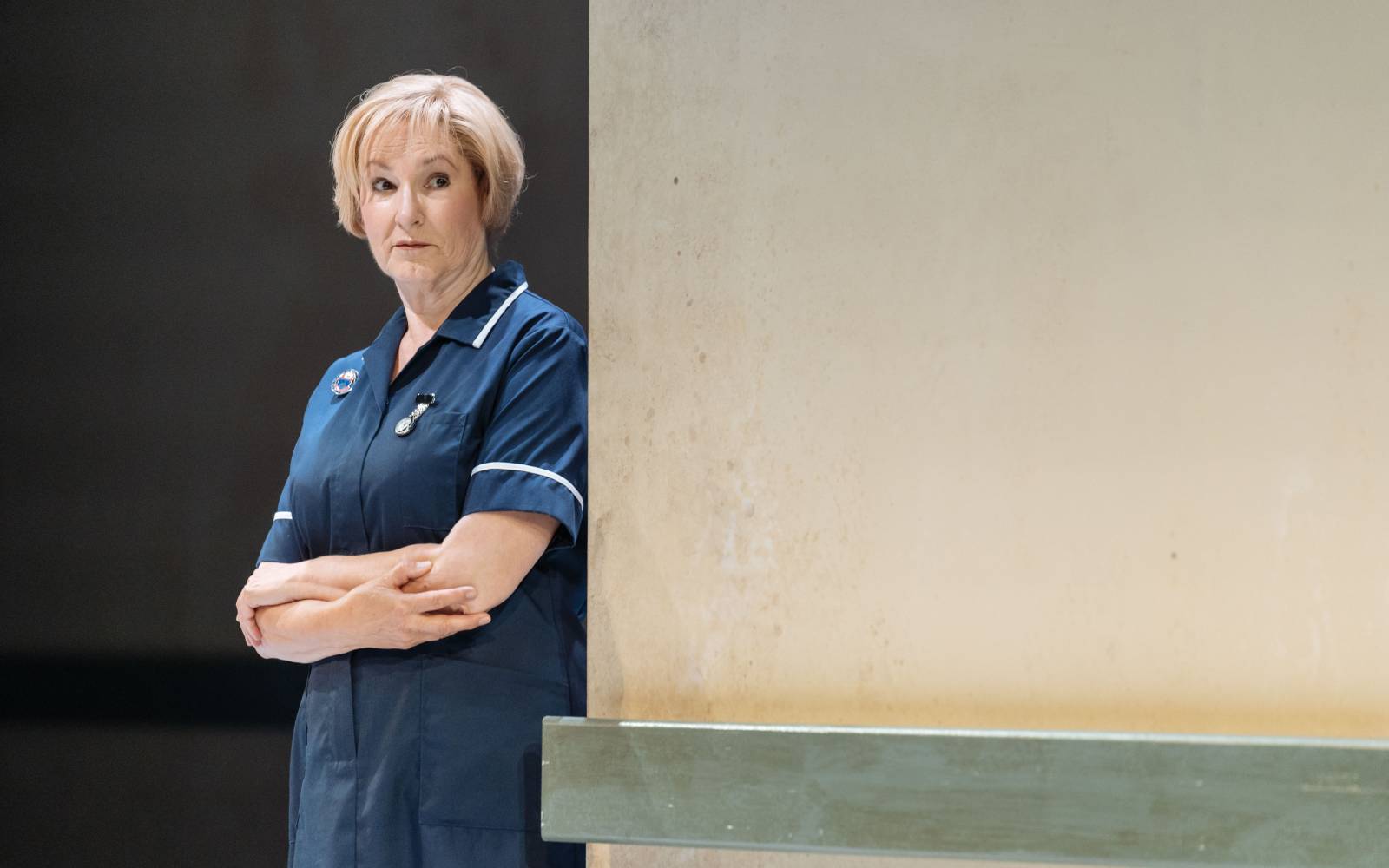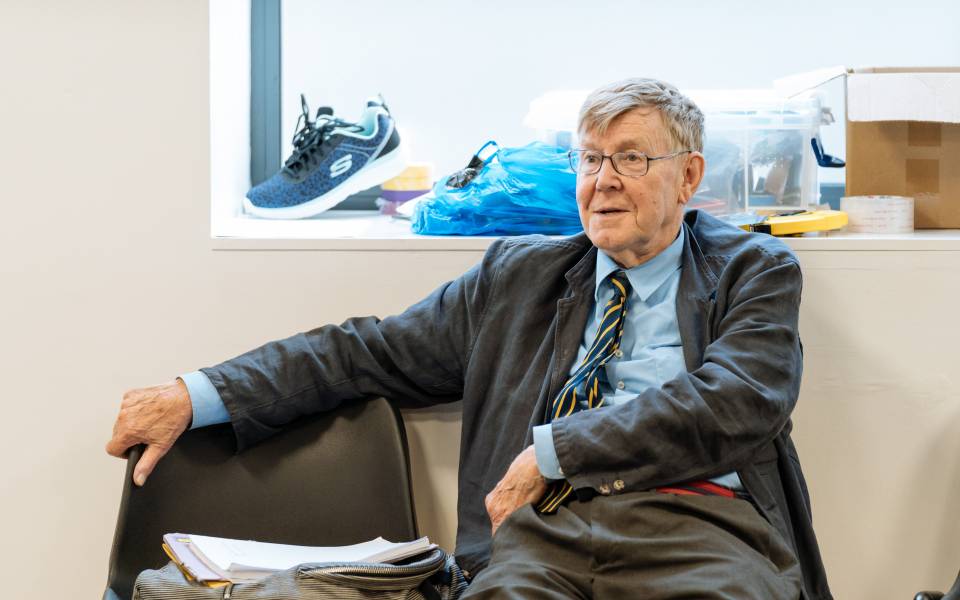
Alan Bennett introduces Allelujah!
I have been writing plays (slightly to my surprise) for 50 years and more and it is a bit late in the day to confess that I tend to write a play before I do the research for it. Otherwise, knowing myself, I’m likely to get too interested not to say bogged down in the facts and so never get round to writing the play.
I first realised this in the 1960s when I was just beginning as a writer, putting together sketches for the Saturday night TV shows that came after That Was The Week That Was. I knew nothing about television and not much more about sketch writing and so made the mistake of over-researching a topic in order to pull out facts that the audience didn’t know. This may have been informative but it wasn’t always funny and I learned early on that in order to interest and amuse an audience one needed to know more than they did but not much more. Ever since I’ve tended to write first and ask questions afterwards. One of the many reasons why I’m happily paired with Nicholas Hytner is that he is of a more literal cast of mind and readily researches the necessary background, querying many of my fanciful notions before putting them to rights. Notably in this play he saw straightaway that in my original draft I was confusing a geriatric ward with a care home and that the difference must be made plain.
I did have some excuse. In theory a geriatric ward is confined to patients who need medical attention because they are ill. They may be ill because they are elderly but age alone does not qualify them for the geriatric ward. It does qualify them for a care home which is for the elderly who don’t require medical attention but do need round-the-clock care. That the difference is not always obvious is because a patient on a geriatric ward who has recovered can’t always be discharged since there is nowhere to discharge him or her to… no relative willing or able to have them, no vacancy in a care home that would, not to mention the possible expense. So they stay put in the geriatric ward and become bed-blockers and in the process the geriatric ward becomes more like a care home than the hospital would like.
Seldom in hospital myself until I was in my 60s such experience as I’ve had has found its way into the play. When I was first hospitalised as a young man nurses were more likely to be disciplinarians than they are today. Beds were squared off and kept in apple-pie order pending the awed arrival of the consultant with his respectful train of underlings. Nowadays nurses have been robbed of their starch and doctors of their white coats and consultants have been known actually to sit on a patient’s bed, all of them casualties of deference and its decline.

The kindest nurse I ever came across wasn’t a nurse at all. Having been operated on for bowel cancer in 1997 I’d been admitted a few months later to the old Middlesex Hospital off Goodge Street with acute pains in my stomach which were unsurprisingly thought to be a recurrence. Thankfully this proved not to be the case, the culprit an abscess on what remained of my appendix. This had to be drained via a tube introduced through the wall of the stomach. Assuming this would be done under valium (a drug I’ve always found delightful) I was unworried and indeed the procedure seemed quite casual, taking place in a curtained alcove off quite a busy corridor in the basement. The doctor with a medical student in attendance busied himself with his preparations which included positioning the screen so that he could follow the tube tracing the source of the infection. It was only when I felt a winding blow to my stomach that I realised there was going to be no anaesthetic and not even a painkiller.
As this scalding snake felt its way round my gut I was in agony, though the doctor and the student, both intent on their screen, seemed indifferent to my cries of pain. At this moment a young man came down the corridor, not a doctor certainly and not, I think, a nurse but just a theatre orderly in hospital greens. Sizing up the situation, unasked, he stopped and took my hand. It can only have been a minute or two before the abscess was found and a drain introduced but it was long enough for me to think that this uncalled-for gesture was perhaps the kindest thing anyone had ever done for me. As the drain began to produce pus in gratifying quantities the young man patted my arm and went on his way.
It’s at this point that life connects with art and the story becomes relevant, as afterwards the doctor made the student examine my emaciated stomach to see if he could find the slight pulse which would be an indication of peristalsis, the automatic muscular contractions by which the contents of the alimentary canal are propelled through the body. It’s the procedure which Dr Valentine in the play explains to Colman as a (slightly far-fetched) metaphor for the slow and steady working of the hospital itself. Back on the ward I tried to find out who was my Samaritan but without success, though I was later told that he had become a doctor himself. I hope so.
In one respect the play makes no attempt at realism. Though mitigated these days by the laptop any ward is still dominated by the television screen, chattering away and the background to pain, sorrow and even death. In our hospital I imagine the TV has been banished to a so-called quiet room though in a proper hospital this would probably be unacceptable.
The absence of television is matched by the non-presence of visitors. Though patients on a geriatric ward are more likely to have visitors than the inmates of a care home, a geriatric ward is hardly a magnet for friends and family – friends mostly dead and family getting on with their lives. It’s more likely to be duty than affection that brings company to an old person’s bedside. And once there what to say as one sits by the bed, these wearisome visits less like meetings than periods of sentry duty with the visitor on the look-out for some glimmer of hope or sense. The whole scenario is definitively dealt with in Charles Causley’s poem, Ten Types of Hospital Visitor, which is quoted in the play.


One of the main characters in the play is Salter, the chairman of the hospital trust. He is much in evidence, talking to the nurses, welcoming new arrivals, very much – and perhaps implausibly for a chairman – hands on. My doubts about Salter’s over-eager involvement were stilled when the director and the designer, Bob Crowley, visited several hospitals in the interest of authenticity and several nurses reassured them that cameras were always a magnet and, “If there’s filming going on, the chairman’s never away”.
Writing a play I have never tried to hide the sound of my own voice. It hasn’t always been where an audience or a critic has thought to find it and certainly not always in the mouth of the leading character. It’s often a divided voice or a dissenting one; two things (at least) are being said and I am not always sure which one I agree with. But that is one reason why I write plays: one can speak with a divided voice. In Allelujah! it means that I have some sympathy with Salter and with Nurse Gilchrist, neither of whom is entirely sympathetic. I subscribe to Chekhov’s dictum that, “It is the writer’s business not to accuse and not to prosecute but to champion the guilty once they are condemned and suffer punishment”.
Staged as it is in my 84th year the play could be taken as a would-be apotheosis though I hope not. It does include occasional jokes that have been with me half my writing life without (perhaps understandably) ever finding a place. Was it at Pontefract Barracks during my basic training in the infantry in 1952 or a few years later in the Ministry of Pensions hospital in Leeds that I heard another soldier make the sauce bottle remark? Now, after 60 years Joe has it to say. Or I hope he does. That depends if it survives the rehearsals which at the time of writing have not yet started. One of Nicholas Hytner’s skills is as a surgeon, slicing away such inessentials – a cosmetic surgeon perhaps, doing lipectomies but never trespassing into the vitals. There will be cuts and alterations so that the script one ends up with is a bit of a bumpy field, the mounds and hollows reminiscent of a deserted village – Wharram Percy it would be, the famous deserted village in North Yorkshire. With ditches marking the site of lost dialogue and occasional tracks that lead nowhere, for me all my plays have a touch of Wharram Percy.
One of the reasons why Nicholas Hytner and I have always worked well together is that plays as I first submit them are generally quite loose-fitting garments which can then be tailored to his (and sometimes the casts’) strengths and requirements. Also doing the tailoring in Allelujah! is George Fenton who has arranged the music and whom I’ve known all my working life as he began his career as a young actor in my first play Forty Years On.
I have always thought there is an element of unsought prophecy in plays: write it and it happens. With this play it’s been almost embarrassing… Lest I be thought to be trailing behind the facts I should say that Valentine’s trouble over his visa was written months before the Windrush business. I had originally intended Valentine to be an older doctor, brought out of retirement by the hospital because of shortage of staff. In which case to refuse him a visa would have seemed more shocking, though no more so than the treatment meted out to the long-established immigrants who were so callously singled out.
If not quite a platform a play is certainly a plinth, a small eminence from which to address the world, hold forth about one’s concerns or the concerns of one’s characters. But not to preach. That is forbidden, though the fact that I always like it when a character steps out of the play and addresses the audience is evidence that I am a thwarted preacher with no other way than this to broadcast my paltry epiphanies. I never like feeling boxed-in by the fourth wall. In this play, though, that problem is to some extent sidestepped as the characters can within the play still address the roving camera, though some more furtively than others. It’s only in the last few minutes that Valentine gets to speak unmediated to the audience by which time he has earned the right… and maybe that’s why he smiles.
Alan Bennett, May 2018
This article was originally published in the production’s programme.
Photos by Manuel Harlan.
Further reading

An Anglo-Saxon Chronicler
Fintan O'Toole
Samuel Beckett complained of being “damned to fame”. Alan Bennett might justifiably complain of being doomed to amiability. Indeed, in his published diaries, we hear precisely this lament: “I shall still be thought to be kindly, cosy…
More →